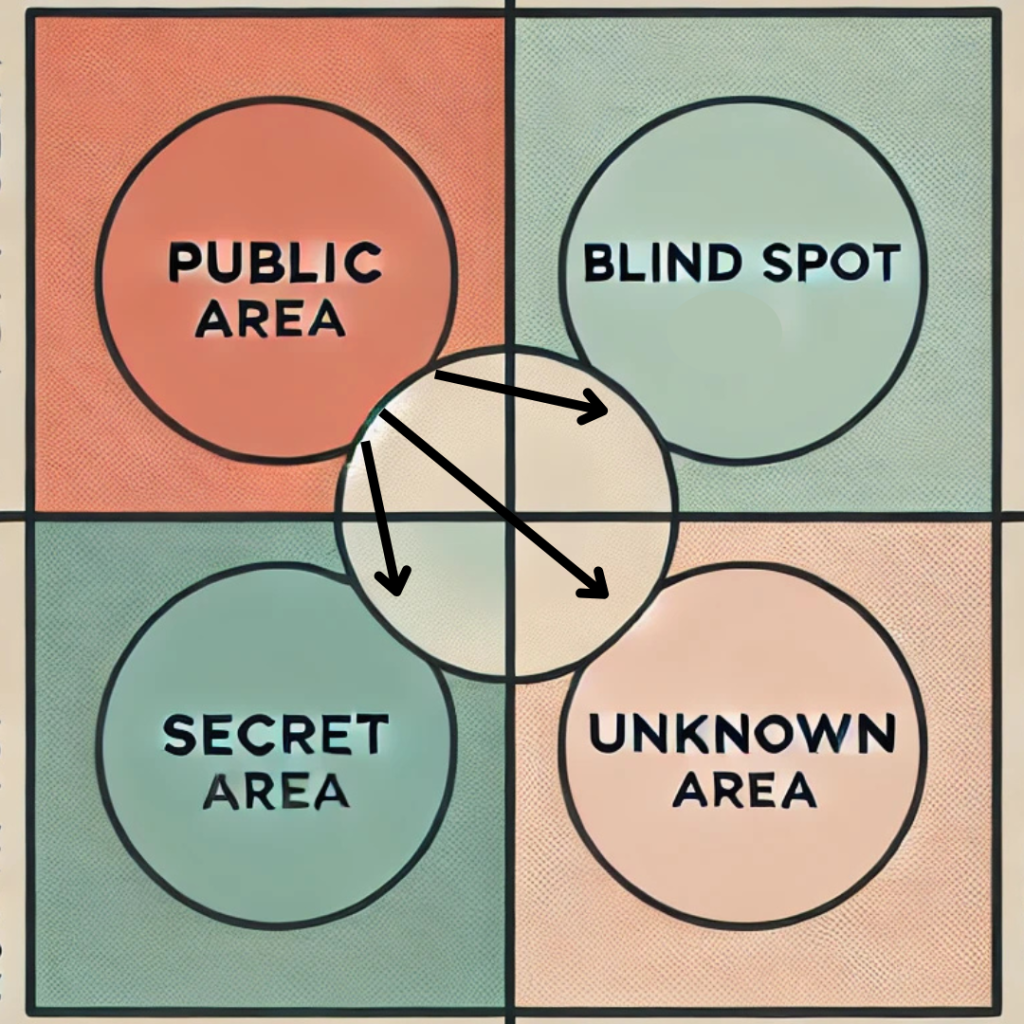When you know feedback is coming—whether it’s in a performance review, a team meeting, or even a casual conversation—what do you feel? For many, it’s a mix of anticipation and anxiety. You might find yourself wondering, “What will they say? Will it be positive or critical? How will it impact my confidence?”
These feelings are completely normal. Feedback can feel like a double-edged sword—offering the potential for growth while stirring up vulnerability. However, what if we viewed feedback as a gift? It’s an opportunity to gain insights into how others perceive us, helping us uncover strengths and blind spots that we might not recognise on our own.
One effective tool for understanding this journey is the Johari Window, created by Joseph Luft and Harry Ingham in 1955. This model helps us visualize our self-awareness and how we interact with others.
The Johari Window consists of four quadrants:
1 Open Area (Open Self):
- This quadrant represents information that both you and others know about you, including your skills, experiences, and personal traits. The larger this area grows, the better the communication and understanding within a team or between individuals. The primary purpose of the Johari Window is to expand this Open Area, fostering trust and collaboration among team members.
For example, if you openly share your expertise in project management, your colleagues are aware of your skills and can approach you for guidance, thereby enhancing teamwork.
2 Hidden Area (Hidden Self):
- This area contains information that you know about yourself but choose to keep private, such as fears, personal stories, or sensitive information. Recognizing what you keep hidden can help you decide what to share with others.
If you’re hesitant to discuss your previous struggles with imposter syndrome, consider how sharing this experience might help a colleague facing similar challenges.
3 Blind Area (Blind Self):
- This quadrant holds information that others know about you, but you’re unaware of. Feedback from colleagues, friends, or family is essential in uncovering these blind spots, allowing you to see yourself through their eyes.
For instance, a colleague might point out that you tend to interrupt during meetings, a behavior you may not realize you exhibit. This feedback can be crucial for personal development.
4 Unknown Area (Unknown Self):
- This quadrant represents aspects of yourself that neither you nor others know. It could include untapped talents or suppressed experiences waiting to be discovered. Exploring this area can lead to exciting new opportunities for personal and professional growth.
Engaging in new activities, like a public speaking course or a creative writing workshop, might help uncover skills you never knew you had.
Building Trust Through the Johari Window
The Johari Window’s focus on expanding the Open Area plays a crucial role in building trust within teams. When individuals share more about themselves, they foster an environment of openness and honesty. Here’s how this works:
- Encouraging Openness: As individuals disclose more about their thoughts and feelings, they contribute to a shared understanding. This transparency allows team members to feel more comfortable and secure, knowing they are being authentic with one another.
- Revealing Blind Spots: When team members provide constructive feedback, they help each other recognize areas for improvement. This process not only enhances self-awareness but also builds a foundation of trust, as team members feel supported in their growth.
- Creating a Safe Environment: A culture that encourages open communication reduces fear and anxiety surrounding feedback. When team members feel safe to express themselves and share their insights, it cultivates trust and strengthens relationships.
Practical Ways to Apply the Johari Window in Teams
- Feedback Workshops: Organize workshops where team members learn about the Johari Window and participate in exercises that encourage sharing and feedback. This can foster an atmosphere of openness.
- Regular Check-Ins: Implement regular feedback sessions where team members can share constructive insights. Encourage a routine where feedback is normalized rather than viewed as criticism.
- Personal Disclosure Exercises: Create opportunities for team members to share personal stories or experiences that they feel comfortable disclosing. This practice can expand the Open Area and enhance connections.
- Anonymous Feedback Tools: Use anonymous surveys or feedback tools to allow team members to share observations about each other without the fear of confrontation. This can help identify Blind Areas.
- Team Building Activities: Engage in activities that promote collaboration and communication, allowing team members to learn more about each other in a fun and relaxed setting.
Embracing feedback through the lens of the Johari Window can be a powerful step in your journey of self-discovery. By understanding yourself better and encouraging open communication, you can enhance your personal and professional relationships.
If you’re ready to dive deeper into this process and unlock your potential, I invite you to reach out. Together, we can explore the exciting opportunities for growth that await you.

Key Takeaways
- Embrace feedback as a gift that provides insights into your strengths and areas for improvement.
- The goal of the Johari Window is to increase your Open Area, enhancing communication and trust within your team.
- Regularly reflect on your Hidden and Blind Areas to foster personal growth and improve your interactions.
- Be open to discovering hidden talents and potentials that can lead to personal and professional growth.
- Use the Johari Window to build trust among team members through openness, constructive feedback, and a supportive environment.
